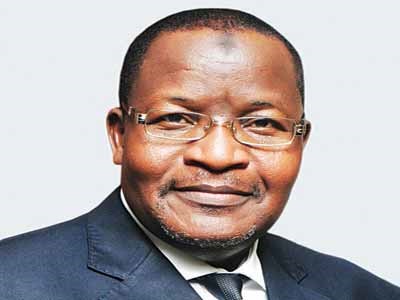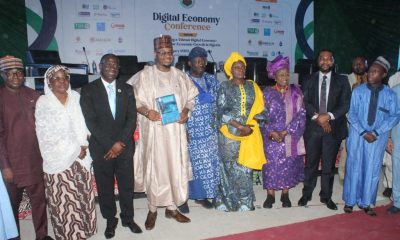NCC
Broadband penetration to develop Nigeria’s economy
Published
10 years agoon
By
Olu Emmanuel
By ADEDEJI ADEYEMI FAKOREDE
EVERY economy that most remain relevant and competitive in the business world, especially in a 21st century environment, must invest both human and material resources in development of its digital technology via broadband penetration and enhancement, which has unlimited potential of enabling entire new industries to emerge; which would invariably reduce youth unemployment through job and wealth creation.
This will culminate into introduction of significant efficiencies into critical sectors like education delivery, payments systems, shopping, health care provision, energy management, electoral process, security reinforcement, information dissemination and management, etc.
It has been empirically proven that every 10% increase in broadband penetration in developing countries results in a commensurate increase of 1.3% in GDP, therefore, no progressive-minded government can underestimate the resultant effects of broadband penetration in its economy.
Recently, the number of Nigerians accessing the Internet through the Global System for Mobile Communications networks leaped by 18.42million in the last one year.
It was raised from 63.4million in February 2014 to 81.9million by the end of January 2015, which was as a result of relentless effort being made by the nation’s telecom watchdog, the NCC to increase broadband penetration in Nigeria’s economy by creating enabling business environment in the telecom sector.
The number of active subscriptions within the period showed a percentage increase of 29.02 per cent, the rising rate of Internet subscription on the GSM networks reflects the increasing importance of data services to subscribers and also, as a stream of income to mobile telecommunication service providers.
Resultant effects of broadband penetration in Nigeria can be felt all over the critical sectors of the economy such as: online shopping outlets, Electronic Payment systems, online social media platforms, online advertisement, online exams/interviews, improvement in electoral process via Card Reader machines, E-library, efficient criminal investigation, etc.
ALSO SEE: No plans to ban VAS —NCC
Broadband penetration has gone a long way in encouraging online shopping outlets like Jumia.com.ng; Konga.com.ng, OLX.com.ng, and other economic activities on the internet to thrive by engaging in a healthy competition with offline shopping outlets like Shoprite, Roban Stores, Exclusive Stores, etc.
One of the major resultant effects of broadband penetration in the country is Electronic Payment System; otherwise known as E-Payment. E-Payment platforms such as: Online Fund Transfer, Automatic Teller Machines (ATM), Point of Sale (PoS) terminals, etc, have revolutionized Nigerian banking sector.
Commercial banks can attest to these irrefutable facts that broadband penetration in the country has reduced the cost of money transactions, because business transactions worth billions of naira can be done via online money transfer without single note of Nigerian currency exchanging hands, thereby reducing risks and cost associated with carrying huge cash around.
Offline shopping outlets which used to be cash-based transactions are now leveraging on PoS technology to thrive, as the latter gives the customers the flexibility in decision making as regards purchase of goods and services.
ALSO SEE: GSM subscriber base hits 148.6m – NCC
In furtherance of its resultant effects on the nation’s economy, broadband penetration is encouraging Nigerians to venture into online media platforms as a means of information dissemination and wealth creation.
The online social media organisations like Facebook, Twitter, Wasp, Saharareporters.com, Premiumtimes.com, Elombah.com, etc, would not be enjoying the popularity and patronage they are experiencing now in Nigeria; if not for the availability and affordability of data services via broadband penetration that is giving subscribers access to all these social media platforms.
It has enabled Nigerians to access news online without having to visit a vendor’s stand for newspapers and magazines. Nigerians are now empowered to update themselves on the current development just by a flip of the touch screen of their smartphones.
The current trend in the social media where millions of Nigerians access breaking news using their smartphones and tablets has made information dissemination more flexible and accessible which has integrated Nigeria into 21st century global community.
Apart from the increasing use of smartphones, telecom operators are also offering modems that help subscribers use SIM cards to connect their laptops to the internet.
Telecom operators are investing heavily in provision of internet services via broadband penetration by building of more reliable network infrastructure to increase the efficiency of data services being rendered to subscribers.
You may like


NCC approves 2,155 phone brands


Broadband penetration in Nigeria is 100% –Buhari


The sociology of social network revolution


NCC Presents 2019 Budget Performance, Defends 2020 Budget at National Assembly


NCC can’t be ready for 70% broadband penetration


Telcos to fund researches, innovations, says NCC boss
Trending

 Entertainment6 days ago
Entertainment6 days agoSimi addresses resurfaced 2012 tweets amid online backlash

 Health1 week ago
Health1 week agoSCFN, LUTH introduce bone marrow transplants as curative treatment for sickle cell

 Health4 days ago
Health4 days agoDeclassified CIA memo explored concealing mind-control drugs in vaccines

 Football1 week ago
Football1 week agoHarry Kane nets brace as Bayern edge Frankfurt 3–2 to go nine points clear

 Football1 week ago
Football1 week agoLate Flemming header stuns Chelsea as Burnley snatch 1–1 draw at Stamford Bridge

 Crime4 days ago
Crime4 days agoSenior police officers faces retirement after Disu’s appointment as acting IGP

 Education6 days ago
Education6 days agoPeter Obi urges JAMB to address registration challenges ahead of exams

 Crime1 week ago
Crime1 week agoTwo killed, seven injured in early-morning shooting in Richmond’s Shockoe Bottom

